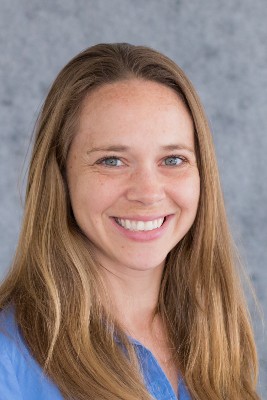By Joyce Bulatao | July 15, 2021

Dr. Stephanie Claussen joined San Francisco State University in 2021 as a faculty member in electrical engineering with a research focus in engineering education. She is also affiliated with the Metro College Success Program. Dr. Claussen’s research interests include engineering students’ and professional engineers' views of ethics and social responsibility, effective pedagogies for socio-technical integration, and the responsible engagement of engineers with communities. She has served as a PI or co-PI on three active NSF-funded engineering education research grants totaling over $1 million. Her disciplinary research focuses on photonics, and includes optoelectronic materials, ultrafast optical characterization, and device design and fabrication.
Prior to joining SFSU, Dr. Claussen was a Teaching Professor with a joint appointment in the Electrical Engineering Department and the Engineering, Design, and Society Division at the Colorado School of Mines beginning in 2013. Dr. Claussen has been recognized with the IEEE Region V Outstanding Educator Award in 2018 and numerous teaching awards from the Colorado School of Mines. She currently serves as an Associate Editor of the Journal of Photonics for Energy.
How did you get into engineering?
“I grew up in Silicon Valley, with one parent who was an engineer and another who was a mathematician (but who worked in engineering). I'm actually a third-generation electrical engineer! So, needless to say, it was assumed that I would study something math or science-related when I got to college. I also really enjoyed those subjects in high school and was excited to use my abilities to better the world around me.
I ended up going to a STEM-focused university but was determined I would study anything *but* electrical engineering. However, I really loved Physics II, especially the part that focuses on electricity and the properties of light. Despite my initial determination to not study EE, that's what I ended up doing (and loving it)”.
What do you like about your career field?
“My disciplinary research is in optoelectronics - the intersection of optics and electronics. This field is very interdisciplinary, as it lies at the overlap of engineering, physics, and materials science. I love that about it - that you have to know a little bit about all these areas. I also love the applications of this field - solar cells, optical communications, lasers, LED lighting.
I now mostly work in engineering education research. I pivoted this direction because I felt that finding ways to empower our future engineers with the skills and knowledge to be responsible, capable, and confident practitioners was the best way I could change the lives of others”
What projects are you currently working on, or have worked on in the past?
Currently, I have two active research projects I am working on. The first is exploring how engineering students and early career professionals understand engineering ethics and social responsibility. This project first started in 2015, when our participants were first year engineering students. Now they are out in industry or graduate school, and we are trying to understand how their views have changed and been influenced over time.
My second project is focused on incorporating sociotechnical thinking into core engineering courses. "Sociotechnical" means the interplay of social and technical considerations inside our engineering work. All of engineering is sociotechnical, yet usually, engineering courses just focus on the technical side of things. In this project, my colleagues and myself are exploring ways to change this so that the sociotechnical nature of engineering is more evident to our students.
What are some of your greatest achievements?
“There is a lot I am proud of from my career - my Ph.D. (Ph. D.s are hard!), my research publications and grants, the chance to now teach at SFSU. But your question asked about my greatest achievement, which actually has no (direct) connection to my work as an engineer. My husband and I have served as foster parents since 2016, and doing that important work is, without question, the most important work I'll ever be a part of”.
What is one piece of advice that you have for students?
“Don't be afraid to bring your whole person to engineering. There is often a (usually unspoken) expectation that you need to check most of yourself at the door of the engineering classroom and come to class ready to focus only on circuits (or dynamics, or machines, or structures, or...). In reality, engineering is a field that is done by people, for people, and influenced by our society (which is made up of other people!). So, don't be afraid to be yourself in engineering. We need it that way so that we can work together to address issues in our communities and the broader world”.